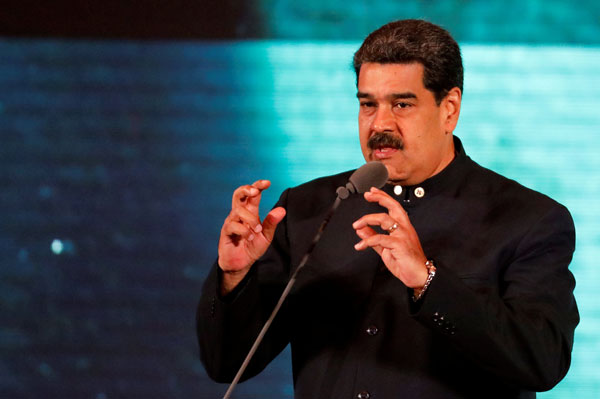
By Ines San Martin
ROME (Crux) — According to a report in an Italian newspaper, Pope Francis has written to Venezuelan President Nicolas Maduro to say that while he’s in favor of a negotiated settlement to the country’s political crisis, previous conversations were halted because agreements were not respected.
Both parties to such talks, the pontiff reportedly insisted, must prioritize the common good over partisan aims.
Addressing him as “Very excellent Sir” and not “president,” according to the newspaper Corriere della Sera, Pope Francis told Maduro in a Feb. 7 meeting that he’s not in favor of just “any kind of dialogue.”
What the pontiff supports is an effort that sees “the different parties in conflict put the common good above any other interest, and work for unity and peace.”
Pope Francis’ letter is a response to one sent by Maduro while the pope was in United Arab Emirates.
“Unfortunately every [attempt] was interrupted because what had been agreed in the meetings was not followed by concrete gestures to implement the agreements … And the words seemed to delegitimize the good intentions that had been put in writing,” the pope reportedly wrote.
Maduro has spoken out on more than one occasion against the bishops of Venezuela and Francis’s right-hand man, Italian Cardinal Pietro Parolin, a former papal representative in the Latin American country.
In the letter, Pope Francis traces the role played by the Holy See and the bishops of Venezuela “as guarantors and at the request of the parties [involved],” in a process that began at the end of 2016, in an attempt to re-emerge from the crisis “in a peaceful and institutional way.”
A constitutional crisis reached a critical point following Venezuelan President Nicolas Maduro’s inauguration Jan. 10. Allegations of vote-rigging by local and international monitors prompted Juan Guaidó, president of the opposition-led legislature, to assume the presidency Jan. 23.
Since then, the international community has taken sides, with the United States, most of the European Union and of Latin America supporting Guaidó, while Russia, Cuba, China, Turkey and UAE sided with Maduro.
In recent comments on the matter, the Trump administration didn’t overrule the possibility of using military force in Venezuela.
On the other hand, at Maduro’s request the national army has blocked foreign aid that has been sent to the Venezuelan people, that’s lost an average of 16 pounds in 2017 due to hunger. The country ended 2018 with an inflation rate of 8,000.
In an interview with the BBC on Tuesday, Maduro said that he would not allow aid in, claiming it was a means for the U.S. to intervene in Venezuela. Speaking at a rally on the same day, Guaidó said that the food would come in through different routes because if not, “300,000 Venezuelans will die.”
“There are almost two million at health risk,” he said.
In his letter, Pope Francis referred to previous efforts to help find a solution to the Venezuelan crisis, requested by Maduro and the opposition. One of the requirements in 2016 was for the government to acknowledge a humanitarian crisis so that foreign aid could come in, yet Maduro has steadily refused to do so.
Another condition for dialogue was that Maduro call national elections, which he technically did, but won under questioned circumstances as most opposition leaders were in prison.
Pope Francis recalls a letter sent by Cardinal Parolin to Maduro in Dec. 2016 in which the “Holy See clearly indicated what were the conditions for dialogue to be possible.” The pope notes that he still considers those requests to be indispensable for the dialogue to develop, and ads that “others that have since been added as a result of the evolution of the situation.”
Among the new requests, Francis speaks of the need for “avoiding any form of bloodshed.”
A parliamentary delegation sent by Guaidó met Venezuelan Archbishop Edgar Pena Parra, a senior official in the Vatican’s Secretariat of State, earlier this week in Rome.
According to Rodrigo Diamanti, who’s in charge of the humanitarian aid sent to Venezuela from Europe and who was a part of the delegation, Pena Parra pledged to support efforts for free elections, and expressed “the will to do everything so that this year we can have free elections in Venezuela.”
